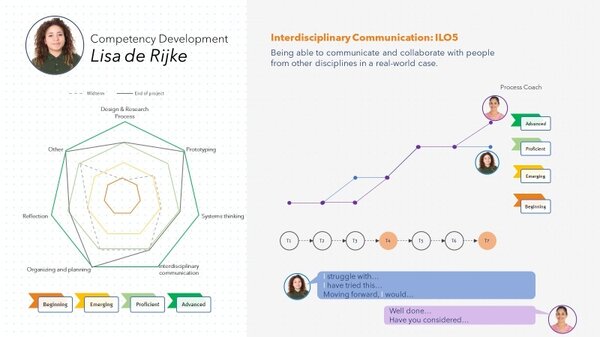
Assessment as Learning to support Competence Development and learning in CBL: A BOOST! pilot.
Challenge Based Learning is an educational approach that promotes the development of disciplinary knowledge and competence development. Students engage in real-life, open-ended challenges, collaborate with peers from different disciplines, as well as other stakeholders (e.g., challenge owners and experts). CBL provides a rich learning environment that helps students contextualize their learning while they put it into practice.
But how do you assess assessment in CBL? And how do you support the development of a student’s competences?
Since 2019, TU/e innovation Space has explored the topic of assessment in CBL through design-based research (link to videos?). Our research has led to conclude that assessment in CBL requires the use of different types of assessment that are fit-for-purpose (ref) and apt to the learning you wish to support in your students. For example, knowledge, team work process, individual development, potentially ask for different forms of assessment (ref). Furthermore, frequent, recurrent (formative) assessment is key to support competence development in CBL (ref). This type of assessment can however be perceived as laborious for students and teachers.
A digital platform for assessment as learning
Our efforts have led to several experimentations regarding assessment as learning in the context of ISBEP (i.e., the innovation Space Bachelor End Project; the CBL variant of the final project for bachelor students). Most recently (since February 2022), we have been piloting a digital platform to support assessment as learning within ISBEP. The pilot is part of the BOOST! program at TU/e (https://boost.tue.nl/). Our aim with this pilot is twofold. First, we want to continue to improve the CBL experience for ISBEP students and coaches. Second, we want to continue learning about the needs of students and coaches regarding assessment in CBL, and to inform the implementation of similar tools at TU/e.
Some of the functionality available in the platform include the possibility for students to self-assess, reflect, and collect feedback on competence development from peers and coaches regularly. In ISBEP, students engage in these activities with the support of rubrics. The platform also generates dashboards to visualize student’s learning gains over time. Overall, the implementation of the platform is expected to make the assessment and feedback process timelier and more efficient, for students and coaches.
An iterative process, promising results
We follow an iterative approach to the evaluation, redesign, and implantation of the digital platform and assessment as learning set up. The full BOOST! pilot takes place in three full ISBEP cycles. We are currently entering the third and last cycle.
While we continue learning and evaluating, our preliminary evaluations yield promising results. Students understand the platform and its use, perceive it as helping them reflect on their learning and keep track of their learning goals. However, our evaluations also point to the importance of using the platform to support in-class activities (not vice versa), as well as to challenges in finding a right balance in frequency of assessment as learning, and promoting self-directed learning in students.
This BOOST! project will be completed in September 2023, when the results and conclusions will be available. Interested to hear more? Get in touch with the project’s team via Ana Valencia at A.M.Valencia.Cardona@tue.nl